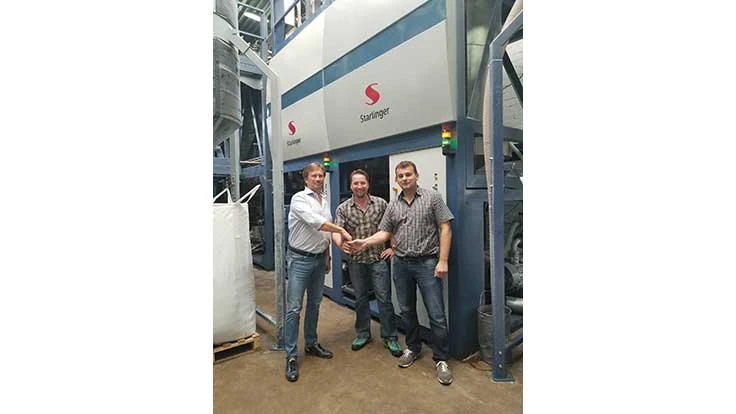
Above: Richard Wüllner of BTB, Christian Lovranich of Starlinger) and Andrzej Zajontz of BTB.
BTB PET-Recycling GmbH & Co. KG, Bad Salzuflen, Germany, recycles polyethylene terephthalate (PET) bottles back into bottles, processing 20,000 tons of PET input material from the German bottle return system PETCYCLE annually. The company was founded in 2006 and has operated a Starlinger recoSTAR PET 165 iV+ since 2007, presently with six SSP (solid state polycondensation) reactors.
BTB PET-Recycling employs from 30 to 35 people and produces food-safe PET regranulate for use in the production of beverage bottles. The company has a positive European Food Safety Authority (EFSA) opinion for its recycled PET (rPET). In addition, BTB PET-Recycling is certified to ISO 9001:2008 and ISO 50001:2011.
Changing market requirements call for flexibility and constant adaptations, Starlinger says. Over the last 10 years, there have been massive changes in the design of PET bottles. They have become lighter and/or their walls have become thinner (causing the bulk density to change significantly), and they may contain additives (acetaldehyde and oxygen blockers).
According to one of the managing directors of BTB PET-Recycling, Andrzej Zajontz, the Starlinger recycling line is insensitive to variations in input material. Parameter adjustments can compensate for these changes, thereby ensuring consistent regranulate quality.
To keep the machine up to date from a technical point of view, upgrades are provided on a regular basis, Starlinger says.
The recycler emphasizes the machine’s ease of operation, allowing for swift training of new personnel, and Starlinger’s service.
Christian Lovranich, head of process engineering for Starlinger’s recycling technology division, has provided support to BTB PET-Recycling from the very beginning and is proud of the line’s high uptime. He says, “The machine achieves an uptime of 95 percent. This means that the output has far exceeded the client’s expectations.”
Service of the machine has been optimized to minimize downtime; the line has to be stopped only for certain maintenance work, such as a knife change, according to Starlinger.
The modular design of the Starlinger line at BTB PET-Recycling offers advantages. By adding an additional vacuum SSP reactor, the capacity can be extended easily, allowing for continuous growth, the equipment provider says. BTB owner Richard Wüllner reports that the company increased capacity by adding one SSP reactor in 2013 and in 2015 to meet the growing demand for food-safe regranulate. In addition, upgrades were made in the areas of washing, bottle sorting and flake sorting. A further increase in capacity is planned for the near future, Starlinger says.
The company’s regular investment in the recycling line shows the recoSTAR PET at BTB PET-Recycling is far from being outdated and instead is well-equipped for the next 10 years, Starlinger says.
Starlinger Recycling Technology is a division of Austria-based Starlinger & Co. GmbH. Starlinger PET recycling systems produce food-safe rPET and are approved for use in food applications by many brand owners as well as by various national and international authorities. The worldwide sales and service support network and technical consulting service help customers to achieve optimum results in the manufacturing process.
Latest from Recycling Today
- U.S. Aluminum Co. explores aluminum fabrication plant in Oklahoma
- Sonoco completes portfolio transformation
- Eriez Shred1 data demonstrates scalable copper control
- RCI selects CurbWaste as exclusive operational management platform
- Updated: Supreme Court strikes down IEEPA tariffs
- Recycling Today Media Group launches Scrap Expo Lunch & Learn Webinar Series
- LyondellBasell scales back recycling target
- Former Liberty UK mills eyed by 3 suitors





